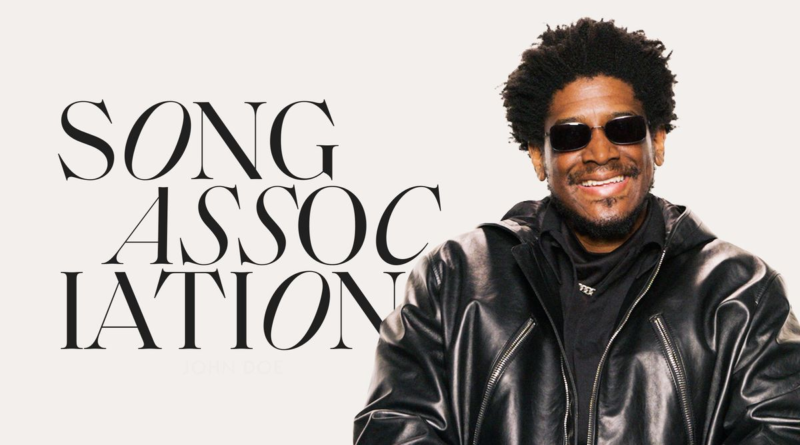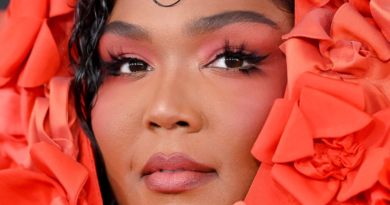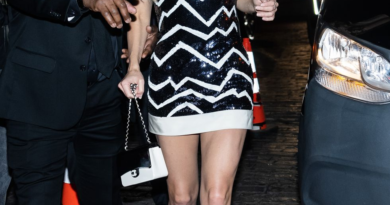<i>Manifest</i> Got Its Second Shot. Melissa Roxburgh Is Ready For Hers.
Melissa Roxburgh has never felt as though Manifest is hers, exactly; it’s certainly “not a show that I would have written myself,” the Canadian-born actress admits when we meet on a breezy Thursday afternoon in May. Arching a palm over her hairline, she shields her eyes from an insistent ray of sunlight and gazes upon the East River from the piers of North Williamsburg. “It definitely took turns that I wouldn’t have chosen on my end,” she says, “but, like—it’s also not my story; it’s his story.”
Here, Roxburgh is referring to series creator Jeff Rake, who’s shepherded the off-the-rails supernatural drama across its four seasons and through a migration from its initial home on NBC to a born-again second chance at Netflix. A spiritual, if diminished, successor to Lost, Manifest follows a thrown-together group of commercial airline passengers who seemingly disappear mid-flight, only to land in New York City five years after their initial departure, their lives now irrevocably changed.
Since its pilot premiere in 2018, the series has become a hit largely thanks to Netflix, which plopped Manifest’s first three seasons onto its platform shortly before NBC pulled the plug in June 2021. The sci-fi drama’s combination of lore (an alchemy of Judeo-Christian beats and Egyptian mythology), conspiracy theories, and fateful timing shot Manifest to the top of the Netflix most-watched charts, and soon after NBC’s “devastating” decision to cancel the show, the mega-streamer vacuumed up the rights for a fourth and final season. This last chapter was then split into two parts, the latter of which debuted today, finally bringing Manifest to an official close.
More From ELLE

Having inhabited one of the main protagonists, detective Michaela Stone, for years now, Roxburgh is popular if not distinctly recognizable. She can still navigate her home neighborhood of Williamsburg in relative anonymity, jean jacket sliding off her shoulders as she yanks at a loose updo, squeezing her lips together and wincing at her own clichés. It’s true that she doesn’t consider Manifest her story, but it’s still “our baby”—oof, cliché—and so she’s learned to trust the instincts the show’s taught her. The first of which was this: A story is over only when you’ve accepted it’s over.
At the end of season 3, the cast was finalizing production at Silvercup Studios in Queens as they processed the news of NBC’s likely cancelation. But as Roxburgh wandered the halls, she avoided saying any direct goodbyes. “It just didn’t feel done,” she says. So when it got picked up by Netflix, her reaction wasn’t one of surprise. “And I don’t mean that in a cocky way,” she explains. “Just more like, I don’t know, I trust my gut.”
She’s happy the show earned its proper close, for the benefit of the cast, the fans, and for Rake himself. (Earlier in our conversation, she’d put it this way: “For me, and I think the rest of the cast, it was more, like, We’re glad Dad got to tell his story.”) Still, she’s aware that satisfying endings are rare, and universal acclaim for those endings much rarer.
“I think some people are going to really hate [the finale], to be honest,” Roxburgh says, “and I think some people are going to really love it, and I don’t think that there is a way around that.”
She continues, “I think after all of the hype from seasons 1 to 4—people invested so much and probably came up with so many of their own theories. Those people are going to be disappointed with [our] version, and then other people are going to be like, ‘Wow, that’s better than I thought.’ I think, for how the show was, it was the best way to end the show. But,” she concludes, “everyone’s going to have their own investments on how it should have ended.”
I probe further. How does she feel about the end of Michaela’s arc, in particular?
She grins. “I don’t know! I thought it was going to end a different way, so I was a little bit invested in a different storyline, but when it ended the way it did, it almost felt better. Like, even though…” She pauses. “How do I describe this? It was like breaking up with someone you love, but then finding something different and good outside of that. It was a different ending than I thought it would be, but a good one.”
But Roxburgh’s personal relief over Manifest’s ending has less to do with how the show went out (and Michaela with it), and more to do with the time the series allowed her, during which she could process a conundrum: Maybe a traditional acting career—whatever that means—wasn’t what she wanted anymore. When Manifest got its second chance, she considered, maybe so did she.
“Young me would have looked at where I am now and been like, ‘That’s where I want to go, and that’s what’s going to make me happy,’” Roxburgh says. “But I think now that I’m here, I’m realizing, like, it’s not that way? And there are so many beautiful positives that come with being in the position that Manifest has given me, but also negatives.”
Practically living on set, away from the real world, “made me realize that I don’t want to act forever,” she says. “I love acting, but I want to be able to be on the other side of the camera.”
She summarizes it thusly, articulating what many other storytellers quietly yearn for: “I do want to be successful, but I do not want to be famous.”
Roxburgh’s father is a pastor, so her earliest recollections of movie-making have a bent presciently reflective of Manifest’s Biblical leanings. “I was trying to make a movie about a girl who got in a car accident, lost her memories, and the only way she got them back is by going back to church and, like, God saved her brain,” she says. Wince. Cliché. She was 10.
Still, it was a young Hayden Christiansen in the Star Wars prequels who convinced a much younger Roxburgh, growing up in Vancouver, that she wanted to be Natalie Portman. (Cliché!) But who can blame her? In high school, she joined drama, and a teacher pulled Roxburgh aside to say she had the stuff to make a career out of the extracurricular. From there, the 17-year-old Roxburgh’s graduation gift from her parents was an acting coach, who introduced her to the agent she works with to this day.
She never quite made it through college, flitting around between majors in film and criminology and psychology and business at Simon Fraser University before ultimately dropping out. It was almost immediately after she moved to Los Angeles six years ago that she snagged the Manifest audition and then the Manifest role, which promptly sent her to New York City for filming. She’s lived in the area ever since.
Something had felt right about Michaela Stone from the beginning; for one thing, the role didn’t require Roxburgh to radically transform herself. “Every audition that I had outside of Manifest was hoops to jump through,” she says. “I remember for one, the project I did end up getting, they basically told me I was too fat and I had to come back skinnier. Stuff like that would happen to me all the time. And when I showed up for Manifest, it was just easy. I walked in, it was right, everyone was like, ‘Yeah, that’s the girl.’”
Still, those off-set “negatives” Roxburgh mentioned earlier—in particular, her exposure to Hollywood’s sexism—made her rise a bifurcated one. “It’s made me simultaneously love Hollywood and hate Hollywood at the same time,” she says now, with little hesitation. Her complaints aren’t new, she recognizes, but that’s exactly what makes them so frustrating. She doesn’t seem to think that, at its core, Hollywood’s treatment of women has evolved in any extraordinary way. Instead, it’s shape-shifted; it’s improved its ability to camouflage.
“I don’t like the attitude that people become a product over time,” she says, after some thought. “I look at some of the super successful girls in my age category—not even just in my age category—and it’s, like, That looks exhausting. I just feel like there’s so much pressure to be so many different things: You have to be humble yet confident; you have to be like pretty but not hoochie. You have to toe this line so gracefully without slipping and falling ever, and it just seems like that energy—the older I get, the less I care about giving.” Another cliché, but this time she doesn’t wrinkle her nose. It is what it is.
Her experiences are a small-scale microcosm of how modern notoriety plays out online, especially amongst the Hollywood set, whose currency is visibility and lack thereof. A few years ago, a photo circulated of Roxburgh on a red carpet. “I was really bloated because I have PCOS, and everyone’s like, ‘Is she pregnant? Is she pregnant?’” she recalls. “I just remember sitting there being like, ‘Man, I really wish people would just, like, stop for a second and understand that there is a human being on the other end.’ And it wasn’t that I was offended, because I did, in all fairness—I looked fucking pregnant. But, you know, me included, we don’t stop and go, ‘Maybe that person’s posting that for this reason. Maybe they needed to post a selfie because they actually had a horrible day and they needed a little validation.’”
Even with her hundreds of thousands of followers across social networks, Roxburgh feels uneasy with attention capital. She attempted media training in her early 20s—lessons included “How Not to Flash Your Vagina When Exiting A Car,” seriously—but struggled with public-relations questions like, “What’s your thing?”
“Anyone who says, ‘This is my thing,’ I don’t know, I don’t buy it,” she says.
Roxburgh wants a second chapter after Manifest, and it’s likely that chapter includes acting. But maybe it doesn’t. “I love storytelling, but I don’t know if it’s in the same capacity as I thought it would be,” she says. She’s working on a script with her sister about tennis, inspired loosely by her own mother’s Wimbledon days. She directed her own episode of Manifest this season (episode 18, “Lift/Drag”), and behind-the-camera work continues to appeal to her. She loved Manifest, and she loves Rake—she wants to make that clear—but she’s eager for a reset.
“Maybe this will get beaten out of me somewhere down the road when I have kids and I’m just like, ‘Give me the paycheck,’ I don’t know,” she says. “But, as of right now, there’s still that human justice fire burning in my belly of, like, I want to tell the stories of the underdogs who overcame the things, the people that were overlooked, the marginalized, whatever…I want to tell stories that matter.” One more cliché. But no one can fault its nobility.
As the sun drops lower and the loungers around us begin to tug their rescue mutts home, we joke about Manifest lore and conflicting theories and intersecting plotlines. (“I lost track, I’m not going to lie,” Roxburgh admits.) We commiserate about our shared transplant status, a Midwesterner and a Canadian incapable of matching the biting wit of native New Yorkers. As such, I ask the dreaded but inevitable question: Why do you like living in Williamsburg?
She laughs, and squints at the Manhattan skyline. “I just like looking in,” she says. During the height of the pandemic, she and her boyfriend would gaze across the river and into the city and think how remarkable it was that—despite the physical distance—the boroughs were symbiotic. Each life within was capable of sustaining (and, terrifyingly, ending) another. “We’re all looking into each other’s buildings right now, and I feel like we’re all just lonely people together, so it’s not lonely. And I like Williamsburg because I feel like I have this ability to look into the city without being in it.”
Post-Manifest, Roxburgh is unsure precisely where acting fits in the puzzle of her career. Manifest’s popularity has given her a glimpse of what’s possible. Can she occupy space in front of a camera without it subsuming her? And if she can’t, is that a price she’s willing to pay—for, God help the cliché, the sake of the art? “Some people thrive being in front of the camera and being in the spotlight,” she says. “I’m realizing I don’t.”
There’s one thing she knows she needs, and that’s a sense of freedom. Anonymity, autonomy, creativity—they all require abandoning expectations for how a story should go. So after witnessing Manifest’s bizarre second life, Roxburgh’s confident she’s capable of directing her own.
Culture Writer
Lauren Puckett-Pope is a staff culture writer at ELLE, where she primarily covers film, television and books. She was previously an associate editor at ELLE.







